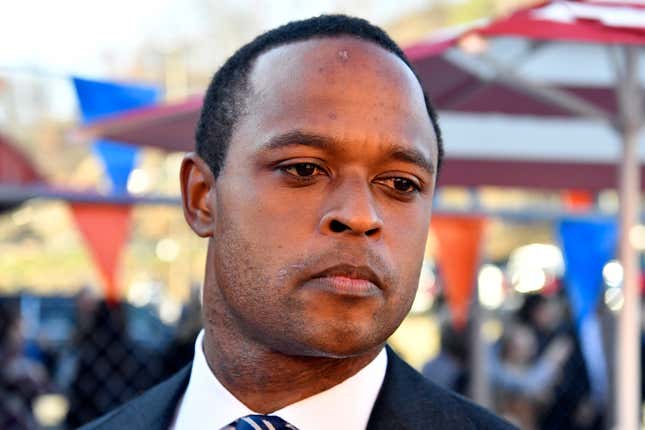
Kentucky Attorney General Daniel Cameron filed a motion Wednesday attempting to bar an unidentified grand juror from speaking publicly about indictment proceedings in the Breonna Taylor case. Last week, the juror made the rare decision to file a motion with the court asking for Cameron to release audio recordings of the proceedings, as well as a request to speak freely about the case and the indictment process.
“As I’ve stated prior, I have no concerns with a grand juror sharing their thoughts or opinions about me and my office’s involvement in the matter involving the death of Ms. Breonna Taylor,” Cameron said in a statement announcing the motion, according to CBS News. “However, I have concerns with a grand juror seeking to make anonymous and unlimited disclosures about the grand jury proceedings.”
“Allowing this disclosure would irreversibly alter Kentucky’s legal system by making it difficult for prosecutors and the public to have confidence in the secrecy of the grand jury process going forward,” Cameron said.
What Cameron told grand jurors has become a major source of contention in the last two weeks. No Louisville Metro Police officers were charged directly for killing Taylor on March 13 during a botched drug raid. Instead, former detective Brett Hankison was charged with three counts of “wanton endangerment” for recklessly firing at Taylor’s apartment from outside, potentially endangering her neighbors. Sgt. Jonathan Mattingly and Det. Myles Cosgrove, both of whom are still working with LMPD, were not charged for fatally shooting Taylor.
Cameron said his office found the shooting justified because police were responding to shots fired by Taylor’s boyfriend, Kenneth Walker, who said he had mistaken the plainclothes officers for intruders.
In the notice filed on Sep. 29, the anonymous juror said Cameron, who served as a special prosecutor in the Taylor case, “attempted to make it very clear that the grand jury alone made the decision on who and what to charge based solely on the evidence presented to them.”
“Using the grand jurors as a shield to deflect accountability and responsibility for these decisions only sows more seeds of doubt in the process while leaving a cold chill down the spines of future grand jurors,” the motion read.
When announcing the results of the indictment, Cameron initially said jurors agreed with prosecutors that no one should be directly charged with killing Taylor. The attorney general also claimed he walked jurors through “every homicide offense, and also presented all of the information that was available to the grand jury,” writes The Washington Post.
Speaking through their lawyer Kevin Glogower, the grand juror said they were bothered by Cameron’s remarks because the grand jury was not given the option of charging Mattingly and Cosgrove, and was only given possible charges for Hankison. Cameron later confirmed that he had not recommended any homicide charges for any of the officers, nor had he recommended jurors charge Mattingly and Cosgrove with a crime.
Last week, attorney Glogower noted that many of the proceedings may not have actually been recorded, making it important that jurors be allowed to speak publicly in order for there to be full transparency about the indictment process.
While Cameron did release audio of the grand jury proceedings last week, the 15 hours of recordings did not include prosecutors’ recommendations to the grand jury because those remarks are not considered evidence, the attorney general’s office said.
Cameron has also suggested the grand jury could have recommended further charges if it wanted.
“If they wanted to make an assessment about different charges they could have done that,” Cameron told local station WDRB. “But our recommendation was that [officers] Mattingly and Cosgrove were justified in their acts, in their conduct, and that officer Hankison at least it was appropriate at this stage to charge him with wanton endangerment.”
Several legal experts have noted that it would be extremely unusual for a grand jury to apply charges beyond what is recommended to them by prosecutors because jurors are typically not well-versed enough in the law to make such recommendations.
Cameron’s motion to silence the grand juror also came on the same day the city of Louisville released documents from LMPD’s internal investigation into Taylor’s killing. As the Washington Post reports, the documents reveal internal criticism of officers’ conduct and decisions on the night they raided Taylor’s apartment.
“The documents show other Louisville officers criticizing the raid and cast doubt on the police department’s justifications for the warrant, a key question addressed only in passing in recently released audio of the grand jury proceedings,” writes the Post.
This appears to line up with earlier interviews SWAT team members who were at Taylor’s home gave to The Courier-Journal and WDRB.
“It was just an egregious act,” Lt. Dale Massey, a member of the SWAT team, told police. “It just seemed like there’s no target identification whatsoever for those rounds that were shot inside the apartment.”
A judge is expected to hear Cameron’s request to bar the grand juror from speaking today.

